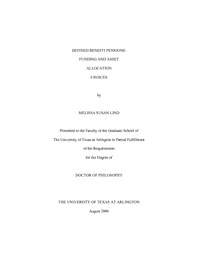Defined Benefit Pensions: Funding And Asset Allocation Choices
| dc.contributor.author | Lind, Melissa Susan | en_US |
| dc.date.accessioned | 2007-08-23T01:56:36Z | |
| dc.date.available | 2007-08-23T01:56:36Z | |
| dc.date.issued | 2007-08-23T01:56:36Z | |
| dc.date.submitted | August 2006 | en_US |
| dc.identifier.other | DISS-1406 | en_US |
| dc.identifier.uri | http://hdl.handle.net/10106/384 | |
| dc.description.abstract | Because of their large size, defined benefit pension plans are an important component of U.S. corporate finances and capital markets. The value of pension plans comprises a sizable portion of the sponsoring firm's assets and impacts the sponsoring firm's profitability and risk. Plan funding status has a direct impact on firm earnings. Corporate sponsors of overfunded plans may reduce or eliminate cash contributions to the plan, improving earnings. In contrast, underfunded plans require large expedited contributions that lower earnings. Plan investment choices may magnify the effect of funding on earnings when markets are volatile and managers invest a greater portion of plan assets in equities. Prior pension research suggests managers utilize pension regulations and pension insurance to integrate pension cash flows with the firm's financial policies. Firm characteristics and managerial incentives are thus strong determinants of funding policies. Five pension policy propositions are examined to help explain the corporate decision making process. | en_US |
| dc.description.sponsorship | Gallo, John | en_US |
| dc.language.iso | EN | en_US |
| dc.publisher | Business Administration | en_US |
| dc.title | Defined Benefit Pensions: Funding And Asset Allocation Choices | en_US |
| dc.type | Ph.D. | en_US |
| dc.contributor.committeeChair | Gallo, John | en_US |
| dc.degree.department | Business Administration | en_US |
| dc.degree.discipline | Business Administration | en_US |
| dc.degree.grantor | University of Texas at Arlington | en_US |
| dc.degree.level | doctoral | en_US |
| dc.degree.name | Ph.D. | en_US |

